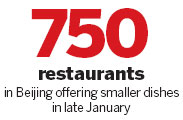Festival banquets challenge to food waste campaign
Updated: 2013-02-16 09:00
By Cheng Yingqi (China Daily)
|
||||||||
Spring Festival is a time when families gather to enjoy reunion dinners, but it also poses a challenge to the recent campaign against food waste.
The campaign - which is sweeping across China with government leaders and Internet users asking people to cut down on extravagant banquets - echoes a call by China's top political leader, Xi Jinping, for a frugal lifestyle.
In late January, nearly 750 Beijing restaurants responded by offering smaller dishes.
|
 |
However, some consumers said that they felt almost "forced" to waste food during holiday dinners.
"In a restaurant near my home, dinner usually costs less than 70 yuan ($11.22) per person. But if you make a reservation for a separate room so that you and your family members can enjoy a more private dinner, the restaurant requires a minimum 100 yuan fee per person, which means that we have to order more food than we need," said 62-year-old Beijing resident Shen Yin.
"This certainly causes waste, but we have no choice because nearly every restaurant has similar rules," she said.
Earlier this month, the China Consumers' Association asked restaurants to abolish the minimum-fee policy during the holiday period. The move was not entirely successful.
China Daily randomly called five popular restaurants in Beijing and found that while some heeded the call, others still require a minimum fee for separate rooms.
On Feb 7, a story in the People's Daily singled out the minimum-fee policy as a major reason for food waste.
According to the report, most high-end restaurants set a minimum fee for consumers who want to eat in separate rooms. The fee varies from several hundred yuan to more than 10,000 yuan.
The minimum-fee policy - an unwritten rule in the catering industry - causes waste, and not only during Spring Festival.
Chen Li, 26, a Beijing resident, said that she is astonished by the amount of food wasted due to the minimum-fee policy, even outside the Chinese New Year holiday.
Last summer, Chen and her classmates went to a restaurant for a farewell dinner. They were charged a 3,000-yuan minimum fee for a 10-people room, while the average cost for a meal at the restaurant was only about 100 yuan per person.
"That meant we had to order three times more food than we needed," Chen said.
However, Chen said that she also understands the restaurant's position.
"When people eat in a separate room, they usually take longer because they chat after eating. The restaurant owners could have received a few batches of clients during that time and made more money, so they charge us for those losses," she said.
Beijing resident Xu Siyuan, 26, said that if people really want to reduce food waste, they should cook at home instead of eating in restaurants.
"We all think about face-saving issues in restaurants," Xu said. "Some people order more food than needed, or don't want to take the leftovers home. If we cook at home, this won't be a problem."
chengyingqi@chinadaily.com.cn

 Li Na on Time cover, makes influential 100 list
Li Na on Time cover, makes influential 100 list
 FBI releases photos of 2 Boston bombings suspects
FBI releases photos of 2 Boston bombings suspects
 World's wackiest hairstyles
World's wackiest hairstyles
 Sandstorms strike Northwest China
Sandstorms strike Northwest China
 Never-seen photos of Madonna on display
Never-seen photos of Madonna on display
 H7N9 outbreak linked to waterfowl migration
H7N9 outbreak linked to waterfowl migration
 Dozens feared dead in Texas plant blast
Dozens feared dead in Texas plant blast
 Venezuelan court rules out manual votes counting
Venezuelan court rules out manual votes counting
Most Viewed
Editor's Picks

|

|

|

|

|

|
Today's Top News
Boston bombing suspect reported cornered on boat
7.0-magnitude quake hits Sichuan
Cross-talk artist helps to spread the word
'Green' awareness levels drop in Beijing
Palace Museum spruces up
First couple on Time's list of most influential
H7N9 flu transmission studied
Trading channels 'need to broaden'
US Weekly

|

|







